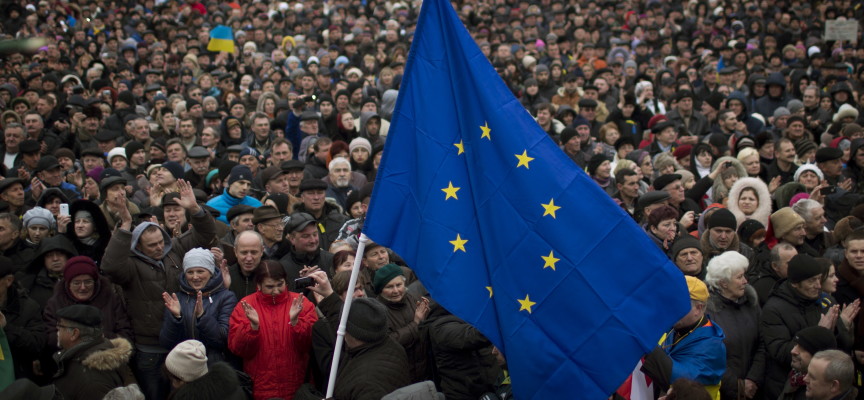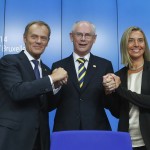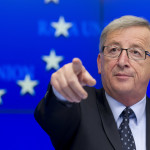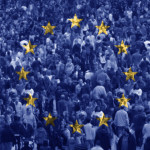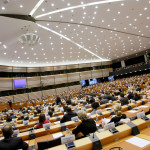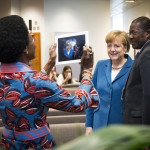In a kind of prelude to the new political season, Manfred Weber, the Chair of the European People’s Party (EPP) in the European Parliament, delivered a noteworthy speech on Europe at the Catholic Academy in Bavaria, Munich.towards the end of 2016. The core of his speech centred on his “Ten points for the self-assertion of Europe”. At first sight, they are simple and obvious – but actually they are not. We set out below a slightly abbreviated version of these “Ten Commandments”.
In former times, European unity was an ideal expounded from every political soapbox. Now it has become reality in many areas, and even a huge success. But Europe’s honeymoon period is now over. In many areas the European Union is part of our everyday life. Europe’s citizens look towards Brussels because they expect it to provide solutions for the really big problems. We will only be able to preserve our peace, our prosperity, our European values and way of tackling problems – in brief, the European way of life – if we manage to succeed in getting Europe to function better. To do this we need to observe the following “Ten Commandments”.
- Finally celebrate Europe’s success.Before Europe was united, our continent was probably the most warlike territory in the whole world. Now peace reigns. Today, however, Europe as a peace project is all but self-evident. Europe represents understanding and solutions forged around the negotiating table. Let us not cover up these successes or take them as self-evident.
- Do not think in egotistical, nationalist terms.Europe is more than the sum of national interests. Joint solutions can only be forged at an early stage if we act together with solidarity and empathy for our neighbours. If we wait until each and every problem has become firmly entrenched in all Member States, we shall always be lagging behind.
- Take the rules seriously.Europe is a community founded on the rule of law, not a self-service shop. Rules must be complied with. Trust is the basis for any coexistence.
- Be open to change.Only those who recognise the need for change early on and get to grips with it positively are able to deal with it successfully. In Europe we finally need to abandon our habit of putting matters on standby.
- Accept responsibility.Democracy thrives on straightforward dialogue, not on avoiding the issue. No decision is made in Brussels to which the national governments have not agreed. However, it is not the place of national governments to raise their hands in agreement while sitting round the negotiating table behind closed doors in Brussels but later, when back home, to indulge in constantly criticising Europe.
- Develop Europe into a full parliamentary democracy.It should be elected politicians, not technocrats, who hold the future of Europe in their hands. Capacity to act must be coupled with democratic legitimation. But this can only be managed successfully if citizens are presented with clear alternatives on which to base their decisions.
- Take democracy in Europe seriously.A parliamentary democracy can only function if it is in good working order. As in the German Bundestag, we should likewise seek to prevent fragmentation in the European Parliament. We also need a 5% threshold for European elections.
- Let us be European patriots.Being at the same time a good Bavarian, a good German and a good European are not mutually exclusive ideas; in fact, they go well together. Forty years ago, Franz-Josef Strauss recognised that the nation state was an anachronism if it did not understand that only through belonging to Europe could it remain strong in a globalised world.
- Let us defend Europe’s values.We have to take care that the soul Europe has won is not lost. Europe is more than a marriage of convenience or a community of interests springing up out of necessity. Europe is much more a community of Judeo-Christian values imbued with the spirit of Enlightenment. We use our understanding of the values of Christian humanity to shape our true strengths. The European social model developed from this understanding is a unique European achievement that should be held up with pride.
- Let us be proud of Europe.Europe is characterised by its enormous cultural diversity, the beauty of its landscapes and its rich abundance of ideas. No other continent has marked its presence worldwide as strongly as we have in Europe. Democracy, the rule of law and our Western way of life all have their roots in Europe.
Let us see Europe as a home to live in rather than a place that is merely administered. Then we can tackle future challenges and – despite all our everyday difficulties – continue Europe’s success story. In all our dealings, let us give Europe new vision, justification and acceptance. Now more than ever, Europe stands for the upholding and re-establishment of its citizens’ sovereignty and the capacity to act of its Member States. Europe stands for democratic self-determination and the assertion of our values. Europe is our life insurance in a globalised world. So let us work together to ensure that Europe and our future are a success.
Manfred Weber MEP
Abridged version of the original speech and compilation of the quotations: Michael Kuhn, COMECE. The complete speech was published in: Zur Debatte. Themen der Katholischen Akademie in Bayern 6/2016, S. 2-4.
(source: Europeinfos #200; translated from the original text in German)
Verso la fine dello scorso anno, quasi a guisa di preludio di una nuova stagione politica, Manfred Weber, presidente del Partito popolare europeo (PPE) al Parlamento europeo, ha tenuto un discorso molto applaudito sull’Europa presso l’Accademia cattolica di Baviera, a Monaco. I “Dieci punti sull’affermazione dell’Europa”, pubblicati qui di seguito, sono il cuore del suo discorso. Sembrano semplici e scontati, pur non essendo semplicistici.
L’unificazione europea un tempo era il ritornello che segnava tutti i discorsi ufficiali. Ora è una realtà di successo in molti ambiti. La sua luna di miele è finita: in molte questioni, l’Unione Europea è ormai parte della vita quotidiana. I cittadini europei guardano a Bruxelles perché si aspettano che risponda ai problemi più grossi che sorgono oggi. Non potremo difendere la nostra pace, il nostro benessere, il nostro modo di vivere, di risolvere i problemi, in breve lo stile di vita europeo, se non riuscendo a far funzionare meglio l’Europa. Per riuscire in questo, si dovranno mettere in pratica questi dieci comandamenti.
- Rallegriamoci per i risultati dell’Europa. Prima dell’unificazione europea, il nostro continente è stato probabilmente il posto in cui si sono combattute più guerre. Oggi c’è la pace. Il progetto europeo di pace però non è ancora scontato nemmeno oggi. L’Europa è sinonimo di dialogo e ricerca delle soluzioni al tavolo dei negoziati. Non teniamo nascosti questi successi e nemmeno consideriamoli come scontati.
- Non pensiamo in modo nazional-egoista. L’Europa è più della somma degli interessi nazionali. Le soluzioni comuni possono essere adottate tempestivamente solo se viviamo la solidarietà e l’empatia con i nostri vicini. Se prima di agire aspettiamo che ogni problema abbia colpito tutti gli stati con tutta la sua forza, saremo sempre in ritardo.
- Prendiamo sul serio le regole. L’Europa è una comunità di diritto e non un negozio self-service. Le regole devono essere rispettate. La fiducia è la base di ogni convivenza.
- Siamo aperti al cambiamento. Solo chi riconosce in fretta i cambiamenti e li affronta con decisione può anche aver successo nel farvi fronte. Dobbiamo uscire dalla situazione di standby in Europa.
- Assumiamoci la responsabilità. La democrazia vive se si affrontano le questioni, non se le si evita. A Bruxelles non si prende alcuna decisione che non sia stata accolta dai governi nazionali. Responsabilità dei governi nazionali non è perciò mettere le mani sul tavolo di Bruxelles mentre si discute a porte chiuse e una volta arrivati a casa continuare a criticare costantemente l’Europa.
- Portiamo l’Europa finalmente a una democrazia parlamentare completa. Politici eletti, non tecnocrati, devono decidere il futuro dell’Europa. La competenza deve unirsi alla legittimità. Ma questo accadrà solo se i cittadini potranno scegliere tra più alternative chiare.
- Prendiamo la democrazia in Europa sul serio. Una democrazia parlamentare può funzionare solo se è in grado di lavorare. Come nel Bundestag tedesco, anche al Parlamento europeo dovremmo evitare la frammentazione. Anche per le elezioni europee abbiamo bisogno di una soglia del 5%.
- Cerchiamo di essere patrioti europei. Essere un buon bavarese, tedesco, europeo, non sono cose che si escludono a vicenda, ma si tengono insieme. Già 40 anni fa, Franz-Josef Strauss aveva riconosciuto che lo Stato nazione è un anacronismo se non si comprende che può rimanere forte in un mondo globalizzato solo grazie all’Europa.
- Difendiamo i valori europei. Facciamo in modo che l’Europa abbia e conservi un’anima. L’Europa è più di un matrimonio di convenienza o di una comunità di interessi nata per necessità. L’Europa è piuttosto una comunità di valori ebraico-cristiani nata nello spirito dell’illuminismo. La nostra forza deriva dalla nostra visione valoriale cristiana dell’essere umano. Il modello europeo sociale che si è sviluppato a partire da questa visione è una conquista europea esclusiva che occorre difendere.
- Cerchiamo di essere orgogliosi dell’Europa. L’Europa è caratterizzata da un’enorme diversità culturale, dalla bellezza paesaggistica e dalla capacità inventiva. Nessun altro continente ha lasciato segni così grandi della sua presenza nel mondo come l’Europa. La democrazia, lo Stato di diritto e anche il nostro stile di vita occidentale hanno radici europee.
Lasciamo che l’Europa sia un luogo in cui vivere e non solo da amministrare, allora riusciremo a superare le sfide future e – nonostante le difficoltà di tutti i giorni – faremo continuare il cammino di successo dell’Europa. Nel nostro fare, diamo all’Europa una nuova visione, giustificazione e comprensione. L’Europa è ora più che mai a favore della conservazione e il recupero della sovranità dei suoi cittadini e della capacità d’azione dei suoi Stati membri. Europa è sinonimo di autodeterminazione democratica e di auto-affermazione dei nostri valori. L’Europa è la nostra assicurazione sulla vita in un mondo globalizzato. Lavoriamo quindi insieme affinché l’Europa e il nostro futuro siano un successo.
Manfred Weber MEP
Rielaborazione del testo originale a cura di Michael Kuhn, COMECE. Il testo integrale è pubblicato in: Zur Debatte. Themen der Katholischen Akademie in Bayern 6/2016, S. 2-4.
(fonte: Europeinfos #200; versione originale dell’articolo in tedesco; traduzione italiana a cura di Eurcom)
Dix commandements pour l’Europe
Comme prélude à la “nouvelle” saison politique, Manfred Weber, le président du groupe du Parti populaire européen (PPE) au Parlement européen, a prononcé un discours très remarqué sur l’Europe à l’Académie catholique de Bavière, à Munich, vers la fin de l’année passé. Les «Dix points sur l’affirmation de l‘Europe» forment le cœur de son discours. Ils semblent simples et comme allant de soi, tout en n’étant pas simplistes. Petit aperçu de ces dix points.
L’unification européenne était autrefois le leitmotiv des incantations dominicales. Elle constitue aujourd’hui une réalité à succès dans de nombreux domaines. Toujours est-il que, pour l’Europe, la lune de miel est terminée. Dans de nombreux domaine, l’Union européenne fait maintenant partie du quotidien. Les citoyens européens se tournent vers Bruxelles parce qu’ils attendent qu’elle réponde aux grands problèmes qui se posent vraiment aujourd’hui. Nous ne pourrons préserver notre paix, notre prospérité, notre manière de vivre, de résoudre les problèmes, en bref le style de vie européen, que si nous parvenons à faire en sorte que l’Europe fonctionne mieux. Pour ce faire, il conviendra sans doute d’en passer par les Dix commandements suivants.
- Réjouissez-vous enfin des réussites de l‘Europe. Avant l’unification européenne, notre continent était probablement le territoire au monde où la guerre avait fait le plus de ravages. La paix règne aujourd’hui. Néanmoins, le projet pacifique européen est encore loin d’être une évidence. À la table des négociations, l’Europe mise toujours sur la négociation et la recherche de solutions. Ne nous dissimulons pas ces réussites mais ne les tenons pas pour acquises.
- Ne vous cantonnez pas égoïstement à une perspective nationale. L’Europe est plus que la somme des intérêts nationaux. Des solutions communes ne pourront être mises au point à temps qu’à la condition d’être solidaires les uns des autres et de nous mettre à la place de nos voisins. Si, avant d’agir, nous attendons que chaque problème ait frappé l’ensemble des États membres de plein fouet, il nous faudra toujours en subir les conséquences.
- Respectez les règles. L’Europe est une communauté fondée sur l’Etat de droit et pas un «selfservice». Les règles doivent être respectées. La confiance est le fondement de toute vie commune.
- Soyez ouverts au changement. Seul celui qui identifie suffisamment tôt les évolutions et y fait face avec ardeur, peut également les surmonter avec succès. Il nous faut, en Europe, sortir enfin de l’attitude passive où nous nous trouvons.
- Assumez votre responsabilité. La démocratie, c’est la prise de parole et pas l‘évitement. À Bruxelles, aucune décision n’est prise si elle n’a pas été approuvée par les gouvernements nationaux. Ils ne doivent pas se contenter de lever la main lors des négociations à huis clos à Bruxelles pour, une fois rentrés à la maison, continuer de critiquer l‘Europe.
- Faites enfin de l’Europe une démocratie parlementaire pleine et entière. Des représentants politiques élus, non des technocrates, doivent décider de l’avenir de l‘Europe. La capacité d’action doit être combinée à la légitimité démocratique. Cependant, cela n’est possible que si les citoyens peuvent se décider entre des options claires et bien définies.
- Prenez la démocratie européenne au sérieux. Une démocratie parlementaire ne peut fonctionner que si elle a la capacité de travailler. Comme au Bundestag, nous devrions également éviter un fractionnement des partis au sein du Parlement européen. Nous avons aussi besoin d’un seuil électoral de 5 % accéder au Parlement européen.
- Soyons des patriotes européens. Il n’est pas antinomique d’être un bon Bavarois, un bon Allemand ou un bon Européen, tout cela va ensemble. Il y a 40 ans déjà, Franz-Josef Strauß avait admis que l’État-nation était un anachronisme s’il ne comprenait pas que, dans un monde globalisé, c’est par l’Europe qu’il pourra rester fort.
- Défendons les valeurs de l‘Europe. Veillons à ce que l’Europe ne perde pas son âme. L’Europe est plus qu’un mariage de raison ou qu’une communauté d’intérêts née de la nécessité. L‘Europe est bien plutôt une communauté de valeurs judéo-chrétiennes imprégnée de l’esprit des Lumières. Nous retirons notre véritable force de la compréhension que nous avons des valeurs liées à la conception chrétienne de l’être humain. Le modèle social européen issu de cette conception est un acquis européen unique qu’il convient de défendre.
- Soyons fiers de l‘Europe. L‘Europe se caractérise par une très grande diversité culturelle, par la beauté de ses paysages et par sa créativité. Aucun autre continent n’a autant marqué l’époque actuelle dans le monde que notre Europe. La démocratie, l’État de droit et aussi notre mode de vie occidental ont des racines européennes.
Habitons l’Europe et ne nous contentons pas de l’administrer, nous pourrons alors relever les défis à venir et – en dépit de toutes les difficultés du quotidien – poursuivre avec succès la voie prise par l’unification européenne. Dans l’action, nous donnerons à l’Europe une vision, une justification et une acceptation nouvelles. Plus que jamais, l‘Europe garantit le maintien et le rétablissement de la souveraineté de ses citoyens et de la capacité d’action publique. L’Europe préserve l’autodétermination démocratique et l’affirmation de nos valeurs. L’Europe est notre assurance-vie dans un monde globalisé. Œuvrons ensemble pour que l’Europe et notre avenir soient une réussite.“
Manfred Weber, député au Parlement européen
Raccourcissement du texte d’origine et compilation des citations: Michael Kuhn, COMECE. L’intégralité du discours a été publiée dans: Zur Debatte. Themen der Katholischen Akademie in Bayern 6/2016, S. 2-4.
(source: Europeinfos #200; version originale de l’article: allemand)
10 Anstrengungen für Europa
Quasi als Auftakt der neuen politischen Saison – hat Manfred Weber, der Vorsitzende der EVP-Fraktion im Europäischen Parlament, in der Katholischen Akademie in Bayern in München, gegen Ende letzten Jahres, einen viel beachteten Vortrag über Europa gehalten. Das Herzstück seiner Rede bilden «Zehn Punkte zur Selbstbehauptung Europas». Sie klingen einfach und selbstverständlich – und sind es gleichzeitig nicht. Im weiteren veröffentlichen wird leicht gekürzt diese zehn «Anstrengungen».
Einst wurde die Europäische Einigung in Sonntagsreden beschworen. Heute ist sie in vielen Bereichen mit großem Erfolg Wirklichkeit geworden. Allerdings sind die Flitterwochen für Europa vorbei. Die Europäische Union ist in vielen Bereichen im Alltag angekommen. Europas Bürger blicken nach Brüssel, weil sie dort Lösungen für die wirklichen großen Probleme erwarten. Unseren Frieden, unseren Wohlstand, unsere europäische Art zu leben und Probleme anzugehen, kurz: den europäischen Way of Life werden wir nur bewahren können, wenn es uns gelingt, dass Europa besser funktioniert. Dafür braucht es unter anderem die folgenden zehn Anstrengungen.
- Gönnt Europa endlich Erfolge. Vor der europäischen Einigung war unser Kontinent vermutlich der kriegswütigste Ort der ganzen Welt. Heute herrscht Frieden. Das Friedensprojekt Europa ist aber auch heute noch alles andere als eine Selbstverständlichkeit. Europa steht für Verständigung und Lösungen am Verhandlungstisch. Lasst uns diese Erfolge weder verstecken noch für selbstverständlich hinnehmen.
- Denkt nicht national-egoistisch. Europa ist mehr als die Summe nationaler Interessen. Gemeinsame Lösungen können frühzeitig nur angegangen werden, wenn wir solidarisch miteinander umgehen und uns in unsere Nachbarn hineinversetzen. Wenn wir warten, bis jedes Problem mit voller Wucht in allen Mitgliedsstaaten angekommen ist, bevor wir handeln, werden wir immer hinterherlaufen.
- Nehmt die Regeln ernst. Europa ist eine Rechtsgemeinschaft und kein Selbstbedienungsladen. Regeln müssen eingehalten werden. Vertrauen ist die Grundlage für jedes Zusammenleben.
- Seid offen für Veränderung. Nur wer Veränderungen frühzeitig erkennt und sich offensiv mit ihnen auseinandersetzt, kann sie auch erfolgreich bewältigen. Wir müssen in Europa endlich aus der Stand-by Funktion rauskommen.
- Übernehmt Verantwortung. Demokratie lebt vom Diskurs, nicht vom Wegducken. In Brüssel wird keine Entscheidung getroffen, der nicht die nationalen Regierungen zugestimmt haben. Aufgabe der nationalen Regierungen ist es aber nicht, hinter verschlossenen Türen am Brüsseler Tisch die Hand zu heben und einmal zu Hause angekommen mit der ständigen Europakritik fortzufahren.
- Entwickelt Europa endlich zu einer vollen parlamentarischen Demokratie. Gewählte Politiker, nicht Technokraten, müssen über die Zukunft Europas entscheiden. Handlungsfähigkeit muss mit Legitimation gekoppelt sein. Dies wird aber nur gelingen, wenn die Bürger zwischen klaren Alternativen entscheiden können.
- Nehmt die Demokratie in Europa ernst. Eine parlamentarische Demokratie kann nur funktionieren, wenn sie arbeitsfähig ist. Wie im Deutschen Bundestag sollten wir auch im Europäischen Parlament eine Zersplitterung verhindern. Wir brauchen auch für die Europawahl eine 5-Prozent-Hürde.
- Lasst uns Europäische Patrioten sein. Ein guter Bayer, Deutscher oder Europäer zu sein, ist kein Widerspruch sondern gehört zusammen. Bereits vor 40 Jahren erkannte Franz-Josef Strauß, dass der Nationalstaat ein Anachronismus sei, wenn er nicht verstünde, dass er in einer globalisierten Welt nur über Europa stark bleibt.
- Lasst uns Europas Werte verteidigen. Sorgen wir dafür, dass Europa seine Seele erhält und behält. Europa ist mehr als eine Vernunftehe oder eine aus Not geborene Interessensgemeinschaft. Europa ist vielmehr eine im Geist der Aufklärung christlich-jüdisch geprägte Wertegemeinschaft. Aus unserem Werteverständnis des christlichen Menschenbildes schöpfen wir unsere eigentliche Kraft. Das aus diesem Verständnis entwickelte europäische Sozialmodell ist eine einzigartige europäische Errungenschaft, die es zu behaupten gilt.
- Lasst uns stolz auf Europa sein. Europa zeichnet sich durch eine enorme kulturelle Vielfalt, landschaftliche Schönheit uns Ideenreichtum aus. Kein anderer Kontinent hat die Gegenwart weltweit so stark geprägt wie wir in Europa. Die Demokratie, der Rechtsstaat und auch unsere westliche Lebensweise haben europäische Wurzeln.
Lasst uns Europa leben und nicht einfach verwalten, dann bewältigen wir die kommenden Herausforderungen und setzen – trotz aller alltäglichen Schwierigkeiten – den Erfolgsweg Europas fort. Im Handeln geben wir Europa eine neue Vision, Rechtfertigung und Akzeptanz. Europa steht heute mehr denn je für die Erhaltung und Wiedererlangung der Souveränität seiner Bürger und der staatlichen Handlungsfähigkeit. Europa steht für demokratische Selbstbestimmung und die Selbstbehauptung unserer Werte. Europa ist unsere Lebensversicherung in einer globalisierten Welt. Lasst uns also gemeinsam anpacken, damit Europa und unsere Zukunft ein Erfolg werden.“
Manfred Weber MEP
Kürzung des Originalbeitrags und Zusammenstellung der Zitate: Michael Kuhn, COMECE. Der gesamte Vortrag wurde veröffentlicht in: Zur Debatte. Themen der Katholischen Akademie in Bayern 6/2016, S. 2-4.
(quelle: Europeinfos #200)
Latest posts by EURCOM (see all)
- What are the aims of the European security and defence policy? - 12 aprile 2017
- The Church is for the European project - 28 marzo 2017
- A message for Europe - 28 marzo 2017

